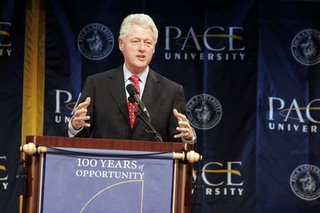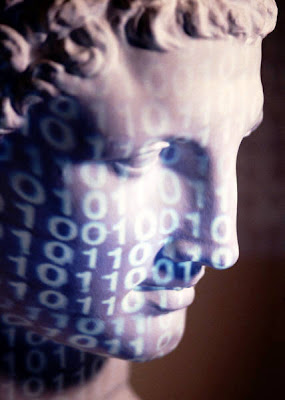Bill Clinton: We Have to Give to the World. But, Why?
 A Pace Toward Civic Activism & World Engagement
A Pace Toward Civic Activism & World Engagement
We are here. Hopefully we also have a future. But how do we get there? The “vision thing” [as a former President called it] is nice to have, but there are choices to be made and how to get there. Much depends on how you see yourself as an individual, as a citizen, and, how you see the world at large. The political debate on the role of the government rages on; the disagreements about the role of the government go back to the time when we became conscious of a national identity.
In these modern times, we’re increasingly becoming interdependent and integrated into the greater sum out there. Local and global issues are intertwined closer today than ever before. The Age of Technology has instantly connected us to our fellow humans throughout the globe. Global environmental issues know no artificial borders. Yet, progress isn’t advancing at the same rate everywhere. This discrepancy can be measured not in different time zones but in centuries! There is a global crisis when billions of humans don’t have access to clean water, food, medicine and education. The advanced countries would be deceiving themselves if they think that they can maintain the present situation for ever. This chasm of wealth and quality of life between the have-nots and the affluent will eventually lead to greater conflicts. We already see this happening around the world It’s about water rights, control of natural resources, and a piece of the pie, as much as ideology & religion.
A big and powerful country like the United States has an important role to play in making the world a better place. This is the theme President Bill Clinton touched upon when he came to Pace University’s Centennial Kick-Off Event last Sunday. Bill is a master communicator and he can motivate people; perhaps he’s the strongest voice out there asking for help on behalf of worthwhile causes and institutions. I don’t know whether he wants to rehabilitate his name after a troubled presidency [failings that don’t even come close to the scale of incompetence exhibited by Dubya’s administration] but he’s on the right track. I’d take anyone who wants to help and actually makes a positive difference. He may have failed to act in Rwanda, for example, and hundreds of thousands of people died, but he can save people's lives today through his engagement--like in the battle against HIV/AIDS, abject poverty, etc.
The majority of people in our world don’t have access to clean water. Some 3 million die, 1/3 of them children, because of water-borne diseases. Billions live on under a $1 a day. Hundreds of million of children have no schooling whatsoever. And, on and on. These conditions breed discontent; desperation leads to desperate acts. Wretched conditions with uneducated minds are prime grounds for the recruitment of terrorists. Clinton correctly pointed out that it is in the interest of the US to improve living conditions throughout the globe. But, how do we do this?
A Culture of Life
To begin, we must relate to people as human beings. To “see them” as he put it. I would add, to recognize that the “culture of life” extends beyond the womb and beyond our national borders. The only regions the US has gained ground (post Iraq war) are those tsunami-affected and the earthquake-stricken areas, because we showed up as people who wanted to help fellow humans. People’s hearts are conquered not by bullets but by kindness. Of course the US cannot solve all problems everywhere by itself, but I think we can do a lot better by having a smarter foreign policy. It would have been smarter if we had allocated a trillion dollars [estimated total cost of the Iraq war & occupation] in a Marshall-type plan (which also benefited the American economy) as we did after WWII in Europe. Smarter, because of the good will we'd have gotten in return, not to mention the greater geopolitical benefits.
Americans are generous people. They raised over $1 billion for the 2004 tsunami victims, almost 50% through the internet. Technology and the internet have given the citizen new & effective ways to participate & be connected-- from his local community, and the national government, to the world at large. We have to do more though, but, again, we have to answer the question, what the role of government is. Contrary to public perception, the US gives a lot less in foreign aid (excluding military) to poor countries than many other advanced countries do. We give about 17 cents for every $100 we make, in private and government donations. Scandinavian countries, for example, give upwards of 80 cents. If every country gave a quarter for every $100 earned (that’s 0.25%) of GNP the world would indeed be a better place to live in.
Choices
OK, there are those who’d say we better fix our house before we go out helping others. I just don’t think it’s an “either-or” proposition, but it's a good idea to have our own house in order. We better do this by throwing out the bums every chance we have at the ballot box. Sunshine is a great disinfectant and civic engagement a must. Under the present White House elite our country has become weaker not stronger. We are in ever-increasing debt, have made more enemies, have lost friends, and we’ve changing the image that this is a land of opportunity, tolerance and progress.
Speaking of image, President Clinton’s has improved since he left the White House. I suppose Jimmy Carter showed him the way to become a world statesman. I’m not going to judge Clinton’s motives, but I like it when an image is used to create substance. Clinton may have faltered in bringing about universal healthcare in this country, but, I welcome his voice in this cause today. We can’t keep on spending twice as much for healthcare and get less for it. We’re spending 16% of GNP on healthcare per year. The next highest spenders are Canada and Switzerland, at 11%. The difference (5%) between 11% and 16 % is $700 billion, a third of which is spend on administrative costs. Many corporations are complaining that healthcare costs add a burden to the company’s bottom line and make their products more expensive, less competitive. It can’t be a good thing when the US ranks 27th in the quality of healthcare. The Stength Within
The Stength Within
It can’t be a good thing when 37 million fellow citizens live in poverty [according to the US Census Bureau], when 46 million are uninsured, when real wages have fallen steadily since 1973 (except during Clinton’s last couple of years in office). What can the government do to affect positive economic change for the greater number of Americans? Can we implement an economic policy that generates good jobs? Or, do we accept the rain when it comes in a “trickle down” fashion?
A stronger America can be a good thing if we make the right choices. But, we cannot maintain our leadership status just by beefing up our military. It is impossible to have a security policy that has a primary focus on killing, jailing, occupying our enemies. We simply we can’t do it fast enough, and, under present leadership, we’re falling further behind in our security needs, and stated goals. We all agree that we need to defend ourselves, but we have to think rationally. “We’re fighting over there, so we don’t have to fight them here,” “the war against terror” that will never end, “this is a crusade,” “we’re fighting the axis of evil,” etc., are not practical strategies. The Bush administration exploited & manipulated Americans' feelings for revenge after 9-11. It exploited the feelings of patriotism. Many Americans wanted revenge; many wanted to feel safe again, so they were willing to believe anything!
Opportunitas
We have a job to do, domestically and internationally, and choices to make. Education is the key, I think, because almost by definition it broadens a person’s horizons. But, you can’t think before you eat, or, get an education before your basic human needs [safety, food, shelter] are satisfied first. Those of us—who are fortunate enough to have the means to satisfy our basic needs and have leisure time to think & learn—must put our good fortune to good use as citizens. There are values, resources, responsibility, and opportunity to be shared. You can sit back and do nothing, or, you can be the change you want to see.















